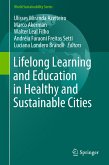This book presents multi-sector practical cases based on the author's own research. It also includes the best practice, which could serve as a benchmark for the creation of smart cities. The global urbanisation index, i.e., the ratio of city dwellers to the total population, has been steadily increasing in recent years. It is highest in the Americas, followed by Europe, Asia and Africa. The city of the future will combine the intelligent use of IT systems with the potential of institutions, companies and committed, creative inhabitants. The administrative boundaries of today's cities put certain constraints on their further growth, but in the future these boundaries will no longer be as relevant. Cities in Europe face the challenge of reconciling sustainable urban development and competitiveness - a challenge that will likely influence issues of urban quality such as the economy, culture, social and environmental conditions, changing a given city's profile as well as urban quality in terms of its composition and characteristics.
Dieser Download kann aus rechtlichen Gründen nur mit Rechnungsadresse in A, B, BG, CY, CZ, D, DK, EW, E, FIN, F, GR, HR, H, IRL, I, LT, L, LR, M, NL, PL, P, R, S, SLO, SK ausgeliefert werden.









